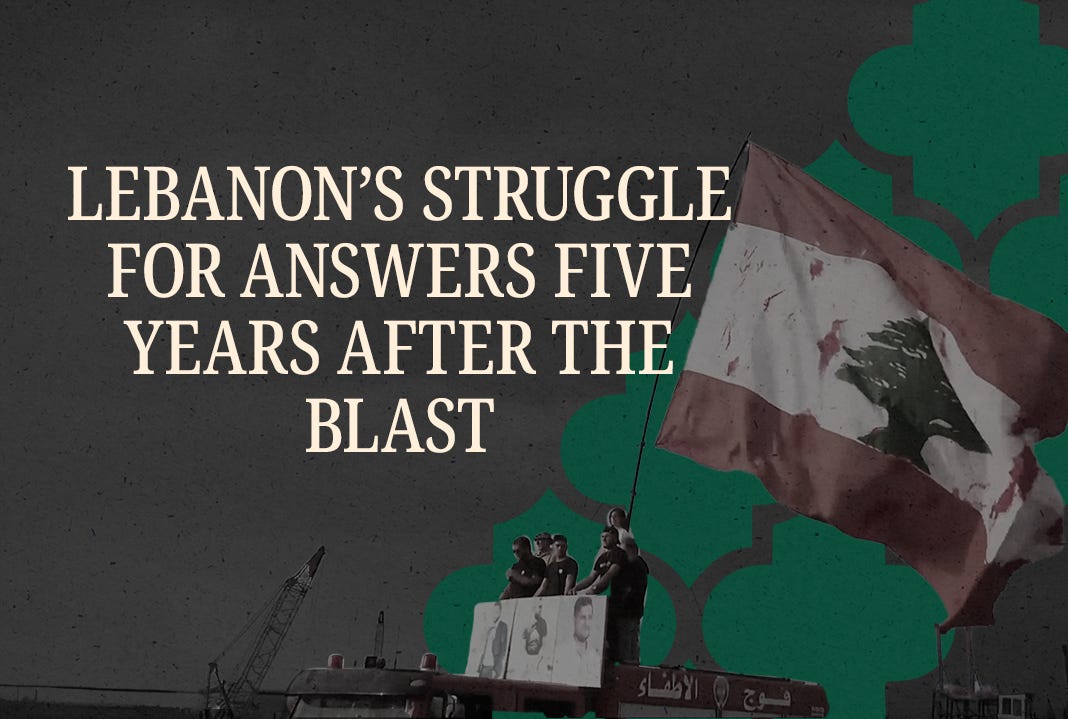Lebanon’s Struggle for Answers Five Years After the Blast
Despite renewed political will, no one has been held accountable for one of the world’s largest non-nuclear blasts
On August 4, 2020, Jad Haddad wrapped up his shift at LAU Medical Center-Rizk Hospital in Beirut and made the 40-minute drive to his family home in Jounieh. With COVID-19 lockdown measures eased, traffic was heavy. He texted his mother a photo of the congestion. “She was like, ‘It’s okay, you’ll have lunch with us. It’s worth it,” he recalled.
Back in Beirut, Mireille Khoury was working late when she noticed smoke rising from a fire at the Port of Beirut. From their home less than 200 meters away, she and her son Elias watched as sirens screamed past. “We thought, ok, now they will just take care of the situation,” Khoury said.
Elias stepped into the next room. Khoury stayed by her computer. She didn’t hear the explosion. “I was moving away from the window, and Elias went to his room, and the second thing I can remember is waking up in the rubble,” she said.
Twenty kilometers north, in Jounieh, Haddad was jolted awake. He thought it was an earthquake. Switching on the news, he saw images of shattered streets in Gemmayzeh, a historic neighborhood known for its vibrant nightlife. Hospitals, already under pressure from the pandemic, were overwhelmed as casualties poured in.
The blast at 6:07 p.m. was one of the largest non-nuclear explosions in modern history. Triggered by the detonation of 2,750 tonnes of improperly stored ammonium nitrate, it killed at least 218 people and injured thousands more. Firefighters had arrived minutes earlier but were unable to access Hangar 12, where the explosive material had sat neglected for seven years. Despite repeated warnings, no preventive action was taken. Five years later, no one has been held accountable.
At a rally in Beirut on Monday, campaigners and victims’ families renewed their calls for justice. Among them was Khoury, whose 15-year-old son Elias was one of the youngest victims. “When the fire started, they didn’t even care to warn people in the area; they didn’t open the door, so firefighters could just throw water over the nitrate. No one would have died,” she said.
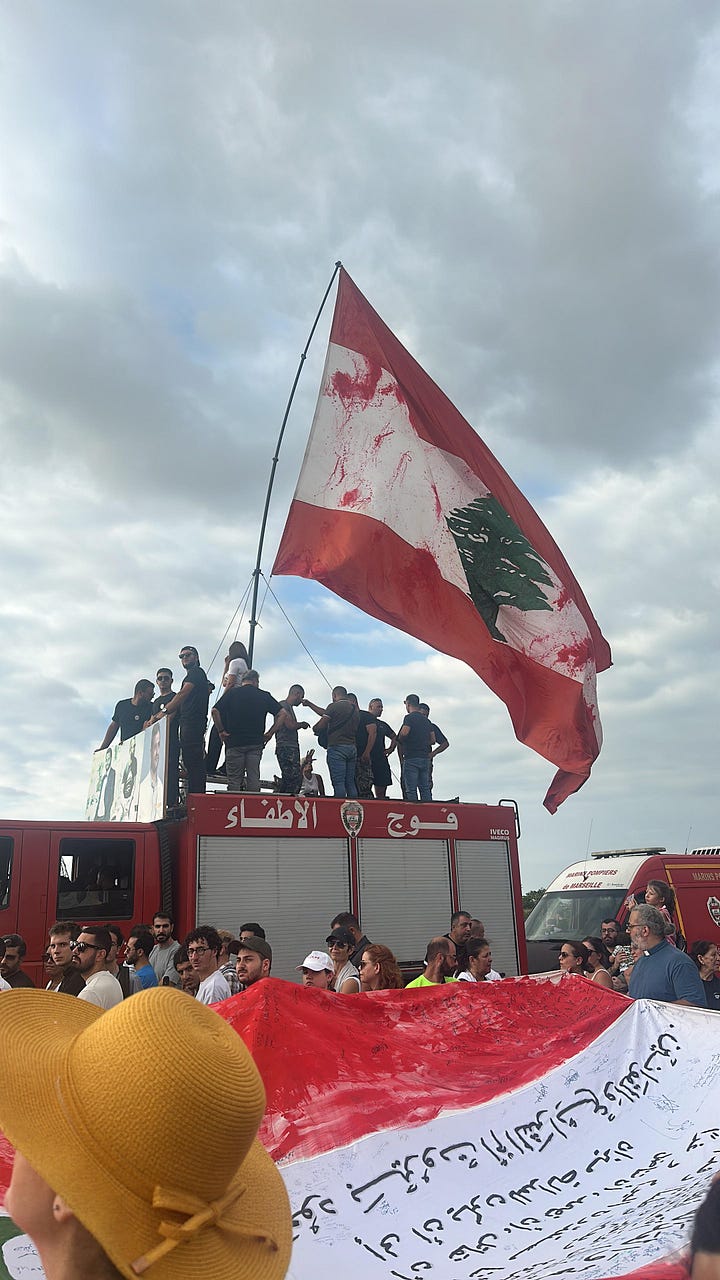
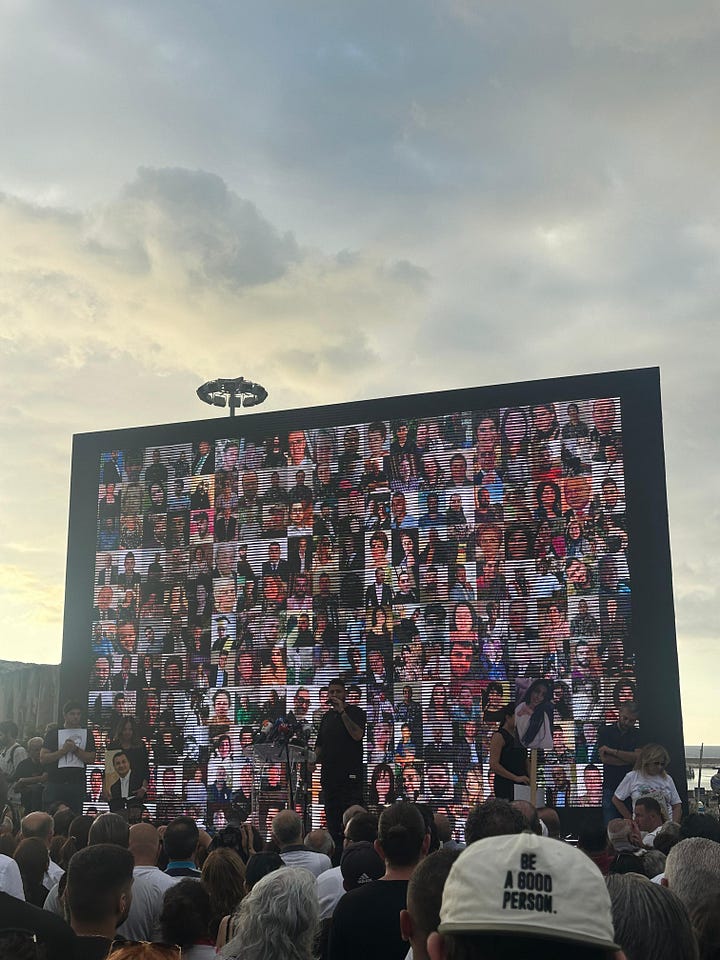
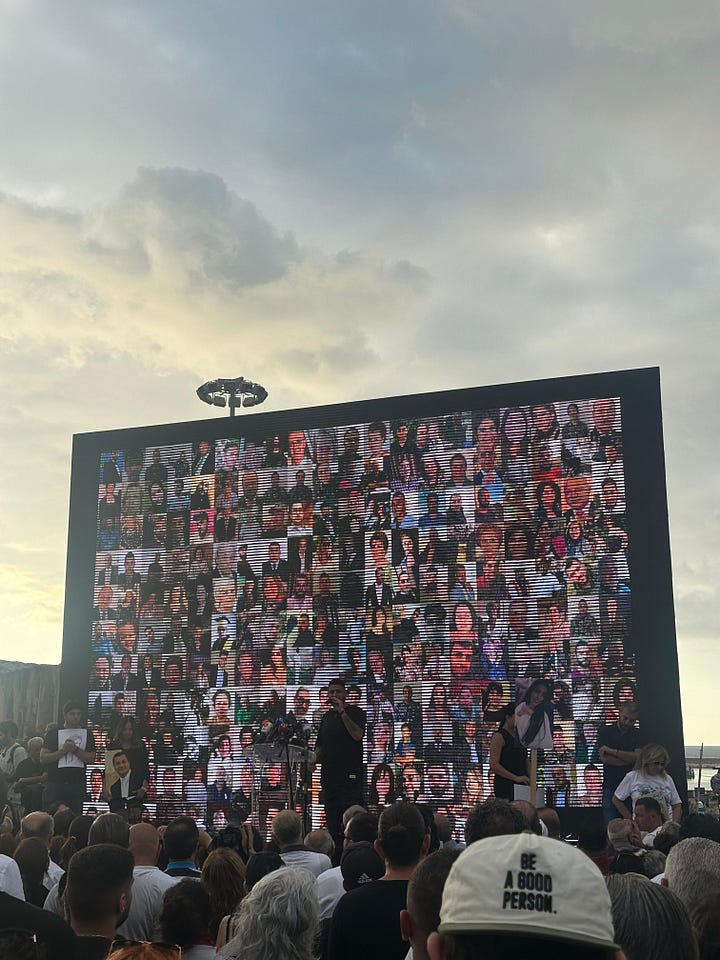
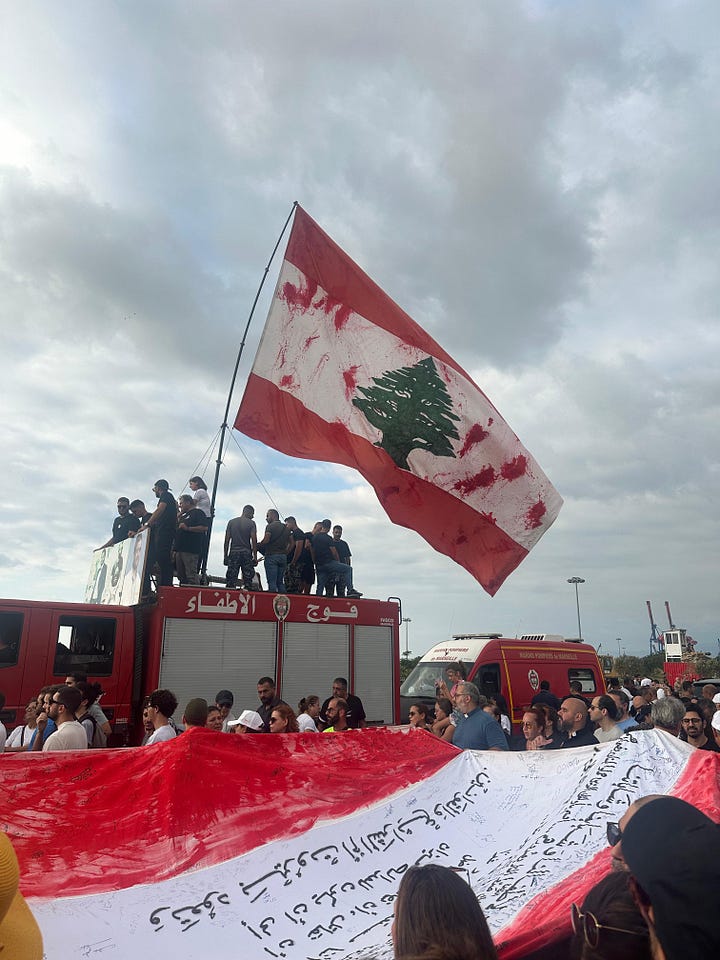
That thought continues to haunt her. Elias would have turned 20 this year. He had dreams of becoming an architect. “We are a shattered family, to tell the truth, our life is not the same, not at all. I cannot say it’s a life, we are just surviving because you have no other choice,” she said.
Seeking justice has become Khoury’s way of honoring her son. “I still feel guilty—that when I saw the fire, I should have protected them, taken him away from the window, that I stayed in Lebanon when I had the chance to leave… for many, many reasons,” she said.
Elias’s school friends joined the campaign early on. Still, many have since left the country, part of a wider exodus of young people disillusioned by the lack of opportunity and justice. “They saw how the government treated us, how they denied us justice, and they felt that we are of no value in Lebanon,” Khoury said.
The official investigation has faced relentless obstruction. A Human Rights Watch report revealed that senior officials were informed of the ammonium nitrate’s presence and chose not to act. Many refused to testify, shielded by a longstanding culture of impunity.
Opposition to the case has come from the highest levels of government. The first judge on the case, Judge Fadi Sawan, was removed due to political pressure. His successor, Judge Tarek Bitar, was forced to suspend proceedings due to political interference, stalling the investigation for several years.
There is now renewed hope. Following the 2025 election of Prime Minister Nawaf Salam and President Joseph Aoun, the government has pledged support for the inquiry. Judge Bitar has resumed his work, issuing new summonses to those implicated in the disaster.
“Today, we are finally beginning to see the file move forward. Justice is coming. Slowly, but surely, the truth is emerging,” said Melhelm Khalaf, a Lebanese MP and president of the Beirut Bar Association, who coordinated hundreds of legal actions on behalf of victims. “This progress is the result of tireless perseverance—from the families, from the lawyers, from all those who refused to surrender.”
For the first time, ministers from the new administration attended the memorial rally—a gesture that would have been “impossible” under previous governments, said Haddad. He returns every year, both in solidarity and to bear witness. “In Lebanon, it is frighteningly easy for tragedies to fade from public consciousness, drowned out by new crises,” he said.
Indeed, Lebanon has endured a seemingly endless emergency for over five years. The ongoing conflict between Israel and Hezbollah has displaced nearly 900,000 people and killed almost 4,000, according to data from the International Organisation for Migration, UNHCR, and the Lebanese Health Ministry.
Life last felt normal in early 2019. Then came the liquidity crisis, caused by years of mismanagement and political instability, which triggered one of the worst financial recessions in decades. Unemployment soared, the public sector collapsed, and the Lebanese lira lost over 98 percent of its value, destroying the middle class.
Protesters took to the streets chanting “all of them means all of them,” demanding the ouster of Lebanon’s ruling elite and a total political reset.
Then COVID-19 hit, plunging the economy further into decline. By 2020, nearly half of the population lived below the poverty line.
When the blast tore through Beirut, over 70,000 homes were damaged and around 300,000 people displaced. Many had no savings to rely on. Support came largely from abroad. “Lebanese people outside, working in the Gulf, France, the US states, and Brazil, began to send money. It was an international movement of solidarity from the Lebanese abroad,” said Micheline Abu Khater, a history lecturer and jewellery designer in Beirut.
Abu Khater survived the blast in her Achrafieh home, although the impact flung her across the room and reduced her surroundings to rubble. “I looked around me and saw the volume of the disaster… people covered with blood were walking in the streets, people shouting on balconies, I looked at the dog, and I saw it bleeding,” she said.
For many, the port explosion has come to symbolize the entrenched corruption that has plagued Lebanon since the civil war’s end in 1990. That war’s former leaders swapped their fatigues for suits, assuming control of state institutions. The sectarian power-sharing system that followed has entrenched division and enabled corruption, with the Port of Beirut emblematic of this decay, where bribes and negligence trumped public safety.
Haddad was lucky not to lose loved ones, but the event left its mark. “I lost a certain degree of innocence that I will never regain. I lost part of the ‘joie de vivre à la Libanaise,’” he said.
In the days after the blast, he and his brother opened their home to the newly homeless. Others followed, using Thawramap—initially created to track protests—to list spaces in private homes, hotels, and schools.
Simon Khoury (unrelated to Elias Khoury) offered two rooms in his home outside Beirut. He and his wife had seen white smoke over the port from their balcony in Dbayeh. Then the ground shook.
This year, the government declared August 4 a day of national mourning. Khoury spent it quietly with his family. “You never really recover from something like that. Seeing the port on my commute is a stark and daily reminder of that fateful day.”
Dominating his view are the massive concrete grain silos that absorbed some of the shock, shielding parts of the city from the worst impact. Today, what remains of the silos stand as an apocalyptic reminder of the destruction wrought by a ruling class that has enriched itself at the country’s expense. A new government and the resumption of the investigation offer a fresh opportunity to hold those responsible to account, bring justice for families who lost their loved ones, and allow the country to move on.
“This tragedy has finally instilled a much-needed sense of agency over their destiny in the Lebanese,” Khoury said. “There’s something inherently unique about Lebanon. And the more trials and tribulations we go through… the harder we grow attached to it.”
Middle East Uncovered is powered by Ideas Beyond Borders. The views expressed in Middle East Uncovered are those of the authors and do not necessarily reflect the views of Ideas Beyond Borders.



